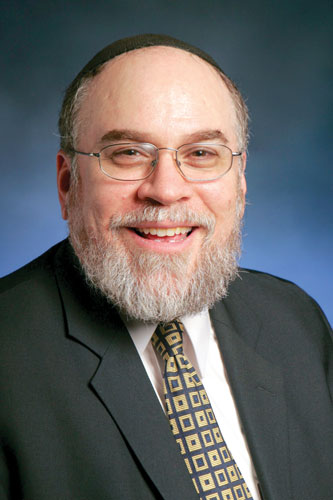.jpg)
New York—Dr. Ephraim Kanarfogel has been appointed a University Professor at Yeshiva University, the sixth faculty member in the entire University to be granted this prestigious distinction. His new title, bestowed upon him by YU President Richard M. Joel, designates him as the E. Billi Ivry University Professor of Jewish History, Literature and Law. The title of university professor is reserved for those who have achieved outstanding goals in teaching, publications and research.
“It is a great honor, well deserved,” said Dr. Lawrence H. Schiffman, vice provost for undergraduate education. “Dr. Kanarfogel’s overall contribution to Yeshiva University and his prodigious scholarship and publications make him a fitting holder of a university professorship. His extensive use of unpublished manuscripts and his methodological sophistication have made possible pioneering, original scholarship.”
Kanarfogel, of Teaneck, NJ, has spent more than four decades at Yeshiva, first as a student and then in various teaching capacities over the past 32 years. He teaches Jewish history at YU’s Bernard Revel Graduate School of Jewish Studies and at Stern College for Women, and is the founding and current director of the Rebecca Ivry Department of Jewish Studies at Stern.
“I believe that I am the first university professor to have been ‘born and bred’ and trained completely at Yeshiva, through high school, college, the semicha program, the kollel and my doctorate,” Kanarfogel said. “Yeshiva always taught us, from our student days, that mastery and creativity are the hallmark of great scholarship and learning, and I am very proud to be able to transmit these values to my students and to give back to the yeshiva–and the university–that has given me so much.”
For now, Kanarfogel plans to continue teaching at Revel and Stern, “and share with my students the fruits of my research and academic studies,” he said. “This designation will allow me to expand my involvement in international conferences and publications, and to continue to produce trenchant scholarship on the highest level of academic Jewish Studies.”
Under Kanarfogel’s leadership, Stern’s Jewish Studies Department “has developed into the leading Jewish studies center for Orthodox women,” Schiffman said.
At Revel, he teaches a wide variety of courses, which are a central component of the curriculum for both master and doctoral students. He also guides doctoral students as they prepare for their general examinations and in the writing of their dissertations.
Drawing upon his impressive research skills and publications, Kanarfogel recently won the fifth Goldstein-Goren prize for the Best Book in Jewish Thought from the International Center for Jewish Thought at Ben-Gurion University. The $30,000 prize—given once every three years—was awarded to Kanarfogel for his book, The Intellectual History and Rabbinic Culture of Medieval Ashkenaz, published by Wayne State University Press last December.
The book was selected from a record-breaking 80-plus submissions and focuses on the intellectual pursuits of the Tosafists, who flourished in northern France and Germany during the 12th and 13th centuries. “It’s an unusual, exceptionally thorough and learned treatment of Tosafist intellectual activity,” said Professor Gerald Blidstein of Ben-Gurion University, the head of the international committee of judges. “This work, which provides a new perspective on Tosafist creativity, will become a standard reference in the field.”
Kanarfogel will be sharing the prize with fellow winner Roni Weinstein, who wrote Breaking of the Vessels: Kabbalah and Jewish Modernity, published by Tel Aviv University Press. “To receive the approbation of an international body of academic peers in this very dramatic way is quite gratifying,” said Kanarfogel. “Moreover, this award means that I have been able to bring to the attention of the scholarly community—and interested readers more broadly—a group of rabbinic scholars and a period that is not as well-known or as understood as some others.”









